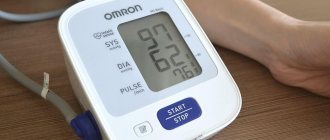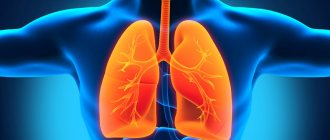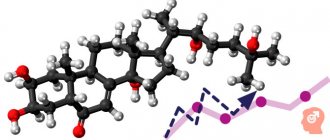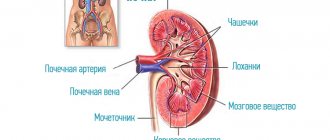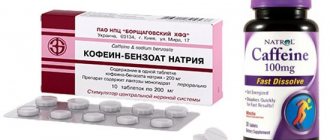Ekaterina Smolnikova
Practicing endocrinologist (10 years of experience). He has extensive experience working in private and public clinics in Russia.
Ask a Question
Last updated June 4, 2021 at 12:56 pm
Medicine of the 21st century is concerned about the issue of hormonal imbalance and is increasingly making recommendations on how to increase testosterone levels in men. This hormone is fundamental in the male body, but often its level is much lower than normal.
Lack of testosterone negatively affects external gender characteristics, excessively pacifies temperament, and reduces the chance of conceiving children. The importance of the substance is difficult to overestimate, so they try to increase its indicator in a variety of ways.
Normal testosterone levels in men, women and children
The study of testosterone levels is not limited to men, because women and children also produce small amounts of this substance in their bodies. The only difference is the place of production of the hormone: in men it is synthesized in the testes, in women ¾ in the adrenal cortex and a small part ¾ in the ovaries. In the female body, the function of the hormone is aimed at the development of secondary sexual characteristics, stable and healthy functioning of the reproductive system, as well as the synthesis of some protein components.
Children and adolescents need sufficient amounts of the substance due to active growth and development. Without the hormone in adolescence, the development of the musculoskeletal system, the growth of the bone skeleton and the development of the muscular system are impossible.
Testosterone circulates in the bloodstream both in free form and in a protein-bound state. Only 2% of the substance is the free fraction of the substance; the remaining amount is associated with albumins, globulins and other proteins of the human body.
The doctor usually prescribes a testosterone test in men, women or children to assess its total, total fraction. If the study revealed low testosterone, a more specific diagnosis will be needed - a test for bound testosterone.
The testosterone level in men is within certain limits depending on the age of the person being studied:
- in boys under 18 years of age, the concentration of the hormone in the blood ranges from 0.2 nmol/l to 37.67 nmol/l;
- in men aged 18-50 years ¾ from 5.76 nmol/l to 30.43 nmol/l;
- in men over 50 years old, ¾ in the range of 5.41–19.54 nmol/l.
- Female testosterone levels are considered normal if they are within the following values:
- in girls under 18 years of age, the concentration of the hormone in the blood ranges from 0 to 4.73 nmol/l;
- in women over 18 years of age ¾ from 0.31 to 3.78 nmol/l;
- in pregnant women, the concentration of the hormone increases 3-4 times compared to the age norm;
- during the postmenopausal period ¾ 0.42–4.51 nmol/l.
however, normal values are sometimes subject to individual fluctuations. Therefore, the interpretation of the test should be handled solely by your doctor.
Menu for increasing testosterone
To obtain the daily requirement of vitamins that increase testosterone, you must include in the menu: 1. Salads from fresh vegetables and herbs (cabbage, cucumbers, carrots, beets, parsley, leeks, dill, basil, peppers, others). 2. Lean meat (baked, boiled). 3. Fermented milk products (kefir, cottage cheese, cheeses). 4. Buckwheat and rice porridge. 5. Nuts and seeds. 6. Fruits and berries (oranges, apples, bananas, currants, beaks, etc.). 7. Decoctions (rose hips, parsley root, celery). 8. Tea with ginger.
To increase testosterone in the blood, it is recommended to take vitamin complexes. A study in the field of andrology has proven that taking medications containing vitamin D, B vitamins, ascorbic acid and other beneficial compounds stimulates testosterone secretion by 30-40%.
When do hormone levels increase?
In women, a slight increase in hormone levels can be observed when taking COCs (combined oral contraceptives), as well as during pregnancy. In both men and women, increased testosterone is a consequence of taking anticonvulsants (for example, therapy for epilepsy), as well as during treatment for hyperthyroidism.
An increase in testosterone is a clear signal that allows one to suspect the development of the following conditions in a patient:
- development of adrenogenital syndrome in women;
- the risk of tumor formation in the ovaries in women and testicles in men;
- Itsenko-Cushing's disease ¾ endocrine pathology, in which there is excessive synthesis of ACTH (adrenocorticotropic hormone) at the level of the brain, which leads to increased activity of the adrenal cortex, where, in particular, testosterone is produced;
- Reifenstein syndrome (male pseudohermaphroditism);
- tumor process in the pituitary gland;
- excessive physical activity of patients;
- in some professional athletes taking steroid drugs.
Increased testosterone ¾ is an important symptom that cannot be ignored. When testosterone increases, the doctor, as a rule, conducts additional diagnostics to find out the reasons for the change in the level of the hormone in the patient’s body.
What vitamins are needed by the male body and why?
A varied diet that satisfies the need for vitamins, minerals and trace elements is necessary for the full functioning of human organs and systems. Nature has established that the male, as well as the female, body is capable of independently producing some vitamins. For example, when exposed to sunlight, vitamin D is synthesized on the surface of the skin.
Some B vitamins are synthesized in the intestines. Therefore, it is necessary to monitor the condition of the digestive organs, which ensure complete fermentation and absorption of nutrients. An important vitamin for men's health is retinol or carotene. Without it, the synthesis of male sex hormones does not occur. Vitamin A is responsible for the production of normal sperm volume and stimulates the secretion of testosterone. Carotene has a mutual bond with zinc. They contribute to the effective assimilation of each other.
Vitamin B1 necessary for a full sexual life
. With thiamine deficiency, the activity of the thyroid gland is suppressed, which leads to a decrease in sexual desire and a decrease in testosterone. Magnesium is necessary for the full absorption of vitamin B1.
Riboflavin is a stimulant of sexual desire. Vitamin B2
improves iron absorption.
Its concentration in the blood decreases sharply during stressful situations. Vitamin B3
maintains vascular tone, improves blood supply to the genitals, promotes good mood and sexual activity.
In pharmacology you can find its other names - niacin, vitamin PP or nicotinic acid. Choline or vitamin B4
refers to substances that are normally produced by the human body. With its help, the synthesis of acetycholine occurs, which is a transmitter of nerve impulses. Vitamin B4 is responsible for erection. Choline is included in the structure of lecithin.
Vitamin B5
is responsible for endurance, strength indicators, normal testosterone production, and a stable emotional background of a man.
Pantothenic acid (vitamin B5) is a necessary component for the complete absorption of biotin, folic, ascorbic, and ascorutic acid, which are involved in the processes of the male reproductive system. Vitamin B6 is responsible for the strength of erection and the quality of orgasm. Pyridoxine is destroyed extremely quickly by smoking and drinking alcohol. Biotin or vitamin H (B7)
is synthesized in the intestines. It helps preserve the youth of the body and improves the functions of the male genital organs. Actively interacts with pantothenic, folic (vitamin B9) acid, cyanocobolamin (vitamin B12). It is better absorbed in combination with magnesium.
Vitamin B9 or folic acid is responsible for the full maturation of sperm and a sufficient amount of seminal fluid
With its deficiency, the degree of absorption of other vitamins belonging to group B decreases.
Vitamin B10
is an important component of erythropoiesis. Para-aminobenzoic acid (PABA) promotes the production of vitamin B9, being part of its structural structure. Participates in the process of sperm formation, supports erectile function, and prevents the aging of the body.
Vitamin B12
actively improves the quality of seminal fluid, is used for male infertility.
Cyanocobolamine increases sexual desire and pleasure during sexual intercourse. For complete absorption, it is necessary to consume it in combination with calcium. Vitamin C
increases the elasticity of the walls of blood vessels, the production of testosterone, improves blood circulation, the functioning of the gonads, and, as a result, the duration and intensity of orgasm, and prevents the development of prostatitis.
Calciferol or vitamin D is involved in calcium-phosphorus metabolism. Indirectly affects the quality of sperm. Calciferol combines vitamin D2 (ergocalciferol), D3 (cholecalciferol) and others into one group. Tocopherol or vitamin E
normalizes blood circulation in the genital organs.
Thanks to it, every cell of the male body is saturated with oxygen, testosterone increases. Vitamin E is effective only when it is supplied regularly and in the right quantity through food.
When does a decrease in hormone levels occur?
In men over 50 years of age, reproductive function begins to decline physiologically, which is accompanied by a decrease in testosterone levels. However, doctors often talk a lot about how to increase testosterone in men in natural ways, so you should not worry about a decrease in the level of the hormone if this is the age norm.
Cause for concern arises when low testosterone appears in a man aged 18-50 years, and the patient's hormone level differs significantly from the testosterone norm for men in this age group.
A decrease in the level of the substance often indicates the development of the following pathological conditions:
- diseases of the pituitary gland ¾ functional or organic lesions of the pituitary gland, which lead to disruption of the synthesis of gonadotropic hormones, which affects the production of testosterone in the gonads;
- pathology of the hypothalamus, which controls the function of the pituitary gland;
- pathology of the adrenal glands: insufficiency of adrenal cortex function, other diseases;
- active use of certain medications, glucocorticosteroid substances;
- hypogonadism (insufficient function of the gonads);
- chronic prostatitis ¾ inflammation of the prostate gland;
- male obesity, female alcoholism;
- malnutrition ¾ insufficient amount of protein in the diet, increased level of “fast” carbohydrates that are easily digested;
- certain dietary rules ¾ vegetarianism, long-term fasting;
- liver cirrhosis, renal failure;
- endocrine disorders that cause an imbalance in the ratio of male and female sex hormones in the human body.
A decrease in hormones in a woman by ¾ is not a very dangerous and formidable sign. As a rule, hormone levels naturally decrease during menopause. However, in this case, it may be necessary to increase testosterone in a natural way, because a lack of the hormone in the body often leads to osteoporosis, increased bone fragility, and affects the psycho-emotional sphere. For example, a woman may experience long periods of depression, insomnia, and even suicidal thoughts.
The level of the hormone in the body is determined using a special blood test. A diagnostic study allows you to detect the problem and begin drug treatment of the patient’s pathology.
Breast growth
Many men start to grow breasts like women, which is not sexy at all. This phenomenon mainly refers to the relationship between the male hormone testosterone and the female hormone estrogen. If a man wants his chest to be adorned with defined muscles, and not two piles of excess saggy skin, it is necessary to maintain high testosterone levels. Of course, don’t forget about a balanced healthy diet and regular exercise - an ideal figure is the result of planned work, and not a coincidence.
What to do with high and low testosterone levels?
High testosterone or low testosterone ¾ are manifestations of some physiological and pathological processes occurring in the human body. Often, a doctor prescribes a blood test for testosterone if he already suspects the formation of any pathology.
For example, the following conditions are considered indications for research:
- doctor's suspicion of female or male infertility;
- tumor process in the adrenal glands or gonads;
- the patient has a certain degree of obesity;
- formation of osteoporosis;
- skin manifestations ¾ acne, which may indicate a significant increase in testosterone levels, oily seborrhea;
- baldness.
In addition, a doctor prescribes a testosterone test in men if he suspects erectile dysfunction or decreased function of the gonads (hypogonadism). Low testosterone is often found in men who experience decreased libido. It is also necessary to check testosterone levels if you suspect the development of chronic prostatitis or osteoporosis. An enlarged mammary gland, as well as insufficient hair on the face and chest, also become a suspicious symptom. Disruption of the process of puberty in boys during adolescence, excessive sweating are also indications for checking testosterone levels.
Women are recommended to undergo diagnostics if they have the following manifestations or suspect the formation of such diseases:
- unstable menstrual cycle, cycle disorders;
- the appearance of uterine bleeding;
- disturbances in the course of pregnancy ¾ miscarriage;
- the formation of multiple cysts in the ovaries (polycystic ovary syndrome);
- endometriosis.
Thanks to the testosterone test, the doctor will be able to detect the pathology that has arisen in the patient’s body. Diagnosis of testosterone levels is one of the most effective methods for assessing the risk of formation of a tumor process and disorders in the reproductive system of men and women. So, after receiving the results of the study, the doctor selects the treatment tactics necessary for the patient with individual dosages of drugs, and after some time, using repeated analysis, monitors the dynamics of treatment.
Sometimes the doctor recommends changing your diet and adding testosterone-boosting foods to your daily meals. At the appointment, the doctor will talk about how to increase testosterone in men in natural ways if the analysis revealed a decrease in the concentration of the hormone. Therefore, the question of how to do this is not too pressing in modern medicine: effective and affordable treatment methods ensure rapid restoration of the patient’s body functions. Naturally, during therapy and after treatment it is necessary to follow all the recommendations of the attending physician.
Low testosterone - treatment
Is there a need to treat low testosterone? Most studies of testosterone treatment indicate improvements in libido and sexual function in men with hypogonadism or low levels of male hormones. Researchers note that the therapy increases interest in sexual relations and increases the number of spontaneous erections. However, testosterone therapy may not improve erectile dysfunction if the underlying causes are not hormonal imbalance.
In addition to its effects on the sexual sphere, testosterone treatment improves mood, relieves symptoms of depression, fatigue and confusion. Research also shows a positive effect on bone density.
Over the past decade, interest in testosterone hormone therapy has increased dramatically. Various forms of this substance are available: short and long-term injections, oral preparations, patches and gels.
Testosterone pills are the most widely available, but urologists and endocrinologists usually do not recommend taking them. In this form, testosterone is quickly metabolized and cannot reach the required level in the blood. In addition, the use of testosterone in this form can cause dangerous side effects - liver dysfunction, including benign and malignant tumors.
Testosterone therapy
How do testosterone gels and patches work? Testosterone patches, although more expensive, are a convenient alternative to injections due to ease of use and maintenance of normal testosterone levels.
There are two methods of delivering testosterone through the skin: patches that are attached to the skin or in the scrotal area, and gels that are rubbed into the skin. Both options provide a constant supply of testosterone, which is absorbed through the skin and gradually released into the blood. But these options will only be effective at a certain level of testosterone, so you must first get tested and only then select a treatment method.
Preparing for diagnosis. How is the analysis carried out?
At the first stage, the patient receives a referral for research. The document is issued to the person by a gynecologist, endocrinologist, andrologist, reproductologist ¾ doctor to whom the patient turned for advice. However, diagnosis requires careful preparation. This is necessary to increase the accuracy of the study.
For example, it is prohibited to donate blood for testosterone if during the day before the test you performed ultrasound diagnostics, fluorographic examination, or underwent physiotherapeutic procedures. Rectal examination during the day can also distort the results of a blood test.
The patient is obliged to warn the doctor about taking hormonal drugs (for example, if a woman takes combined oral contraceptives as a method of contraception), as well as gel-based substances and ointments. The doctor will decide on the need to temporarily stop taking medications if this does not threaten the patient’s condition. It is allowed to donate blood for testosterone 2 weeks after stopping taking hormonal medications.
24 hours before diagnosis, any physical activity or drinking alcohol is prohibited. In addition, you need to stop smoking and change your diet slightly: do not eat fatty or fried foods the day before the diagnosis. Blood sampling for testosterone levels is carried out in the morning (before 11 am) on an empty stomach. During this period, the amount of the hormone in the blood reaches its maximum value.
In addition, to avoid distortion of the results during the diagnosis (for example, increased testosterone or low testosterone when receiving diagnostic results), it is necessary to stop drinking coffee, stimulating drinks, and also avoid stress and nervous tension 1 hour before the procedure.
Attention! The patient should warn the doctor if his diet differs from the normal diet. For example, followers of vegetarianism or people who exclude certain foods from their diet need to tell their doctor about this in order to correctly interpret the diagnostic result.
Preparing for a blood test for testosterone in women has its own characteristics and depends on the menstrual cycle. It is believed that the collection of biological material should be carried out on days 6-7 of the menstrual cycle. The patient's blood serum is used as diagnostic material. The research method is called enzyme-linked immunosorbent assay (ELISA).
Poor sleep and depression
Sleep disturbances and depression are not caused by the neighbor's kids playing the violin or the friend who bought a new car. Look elsewhere for the real culprit and get your hormonal picture checked. Don’t think that waking up in the middle of the night will go away on its own or that dark thoughts will be swept away by a beautiful sunny day. Take all these symptoms very seriously and maintain proper levels of testosterone, the main male hormone.
Everyone has the chance to go beyond average and feel great. But you can live with full lungs and return to the shape you have long dreamed of. To do this, you need to check your hormone levels and correct their imbalance.
Progress of the study
The patient is recommended to come to the laboratory 30 minutes before blood sampling in order to adapt to external conditions and normalize breathing. In a laboratory setting, blood is taken from a patient’s vein.
A standard set of materials is used: a disposable syringe or a special system. As a rule, the patient does not experience discomfort because a small amount of blood is needed for diagnosis. After 1-2 days, the laboratory provides diagnostic results on a special form. The interpretation of the results of the analysis is carried out exclusively by a doctor who knows the characteristics of the patient’s body.
The level of the hormone can be influenced by many different factors, ranging from stressful situations and nervous tension, to a specific diet and the presence of bad habits. Chronic diseases, episodes of decreased immune defense, use of steroid substances - these conditions can cause changes in the amount of testosterone in the human body.
In addition, testosterone levels often depend on the time of year.
For example, in the fall there is an increase in the hormone in the human body. Therefore, independent interpretation of research results in most cases turns out to be incorrect. So, the analysis should only be deciphered by your attending physician.
Testosterone treatment – what tests to do?
Patients receiving testosterone therapy are advised to have their hormone levels checked every 3-4 months during the first year of treatment. The first follow-up visit to the doctor is required in a month. The urologist will evaluate the effect of therapy and determine whether the dose of testosterone needs to be reduced or increased.
The optimal time of day to measure testosterone levels depends on the form of administration. The highest concentration of testosterone in the blood serum is observed approximately 4-8 hours after administration of the drug. When using the gel, testosterone levels are maintained at a relatively constant level, so testing time is not critical.
Men using testosterone therapy should perform the following tests (before and periodically during follow-up):
- PSA analysis;
- Ultrasound of the prostate gland;
- Rectal examination of the prostate gland - to monitor the effect of therapy on the prostate gland;
- Hematocrit and hemoglobin test - to measure the number of red blood cells.
How to maintain hormone levels?
An increase in hormone levels, depending on the reasons, is often corrected with medication. The doctor prescribes a specific treatment regimen and then monitors the effectiveness of the treatment. However, there are situations when testosterone levels are low, and a man thinks about how to increase it in natural ways. This is a simple process if it does not concern organic pathology, and the decrease is explained only by functional reasons. Many doctors talk about how to increase testosterone, highlighting several main ways to solve the problem:
- Proper and rational nutrition. Doctors insist on eating foods rich in zinc, vitamins, microelements and other beneficial substances.
- Rational physical activity. During active sports, testosterone is actively released, which allows you to increase the level of the hormone in a natural way.
- Getting rid of excess weight, eliminating factors that contribute to excess weight gain (decreased physical activity, consumption of fatty, fried, overly processed foods).
- Competently designing a working day that corresponds to your biological clock. Rational distribution of work and rest time will help the body clearly and correctly adjust the hormonal balance.
- Refusal of nutritional supplements and products that stimulate the production of estrogen - the female sex hormone, which is found in small quantities in the male body. With the active production of estrogen, the intensity of testosterone synthesis in a man decreases.
These five ingredients will help increase testosterone naturally. Special attention must be paid to proper diet, because nutrients, vitamins, and minerals supplied with food become the basis for metabolic processes in a man’s body. Therefore, it is very important for a man to follow the principles of a healthy diet.
Avoid stress
Stress is characterized by the body constantly being in a standby mode. The person can't relax. This constant “ready state” eventually exhausts the adrenal glands and leads to exhaustion, burnout and depression.
In a stressful situation, the body releases a lot of the stress hormone cortisol, which is inversely proportional to testosterone. Cortisol and testosterone work in opposite ways - when one goes up, the other goes down.
The higher the cortisol level, the lower the testosterone level. Less stress, more testosterone.
The equation seems simple and actually doable. Don't fall victim to chronic stress. There is no need to read negative chronicles and news that upset you. Excessive alcohol consumption, smoking, frequent consumption of processed foods, bad relationships and unresolved situations from the past are also causes of stress on the body. Surround yourself with positive people. Laugh more.
Causes
Testosterone production can noticeably deteriorate under certain conditions, including:
- The man is overweight. When body fat exceeds the individual norm by 30% or more, the organs of the endocrine system almost completely stop producing testosterone and begin to produce estrogen, that is, the female sex hormone.
- Alcohol abuse.
- Physical inactivity.
- Chronic lack of sleep - androgens are produced in the largest quantities during sleep, and its lack can negatively affect the secretion of sex hormones.
- Psycho-emotional stress. At the moment of quarrels, irritability, aggression, resentment, cortisol begins to be intensively produced, suppressing the secretion of testosterone.
- Overheating of the scrotum area. For normal functioning of the testicles, their temperature must be lower than body temperature.
- Wearing tight, tight underwear, which leads to compression of blood vessels and, accordingly, disrupts blood flow.
- Smoking. Substances contained in nicotine inhibit the secretion of most hormones, including testosterone.
- Irrational and poor quality nutrition. The likelihood of decreased secretion of sex hormones increases if a man likes smoked foods and soda, eats fast food, regularly drinks instant coffee, and eats soy foods.
You also need to know that medications - diuretics, antidepressants, antiandrogens, antihypertensive and sleeping pills - can also negatively affect the production of male hormones.
Therefore, you need to select treatment together with your doctor, taking into account not only the severity of the underlying disease, but also age and individual characteristics of the body.
Eat fatty foods
Although until recently fat was considered enemy number one, according to new research, the situation has changed. Fats are not harmful. In addition, 20% of our menu should be fat.
Since testosterone is synthesized from cholesterol, a higher fat intake will promote increased testosterone production.
Fats that are good for the body and good for testosterone production are unsaturated fats such as peanut oil, olive oil, and avocado.
Among the saturated fats that are good for testosterone are: red meat, coconut oil, egg yolks, cheese, dark chocolate.
Mandatory physical activity
Simply sitting in front of the TV and making pious plans to start a healthy lifestyle “next week” will not increase your testosterone levels. In addition, more fat deposits will accumulate and sexual appetite will weaken. To achieve results you need physical activity.
Five exercises aimed at achieving the highest possible testosterone levels:
- morning jumping;
- classic squats;
- wide push-ups;
- push-ups with “closing the book”;
- push-ups with palms spread.
In order for the exercises to really bring benefits, you must follow the instructions:
- each exercise must be performed for 60 seconds without a break;
- after all 5 exercises, rest for 2 minutes;
- repeat the entire set of exercises 5 times.
As for the volume of training, it should not be too long. In fact, with long-term workouts lasting an hour or more, testosterone levels decrease. The optimal training duration is 1 hour.
What happens after a long workout? The body is under stress and begins to produce the stress hormone cortisol. This negatively affects your well-being, stresses your adrenal glands and competes with testosterone. And testosterone, unfortunately, never leaves the battle with cortisol as the winner.
Introduce strength training
One of the first and most effective ways to increase testosterone levels is through strength training aimed at increasing muscle mass. The main condition for such exercises is the presence of weights. Training is carried out with weights: barbells, dumbbells, kettlebells, on exercise machines. Exercises such as squats, bench presses, and deadlifts are useful.
Basic rules for strength training to increase testosterone:
- Go to the gym 2-3 times a week.
- Train for 1 hour.
- Do 3-4 sets of each exercise and 6-12 repetitions.
- Maintain intervals between sets of 60-90 seconds.
- Perform exercises with moderate intensity.
- Do not train to failure (causes overtraining).
Important! If there are other symptoms in addition to low testosterone, such as groin pain, physical activity is prohibited until consulting a doctor.

